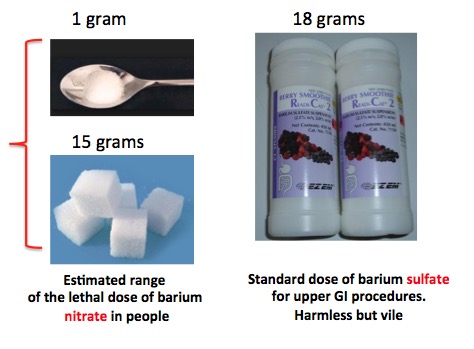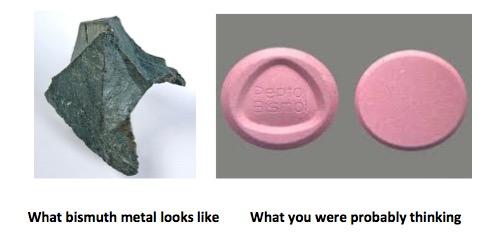BARIUM
If you mention the element barium to someone, it will elicit one of precisely two responses:
- They will think of some god-awful stuff that they once had to swallow before getting stomach x-rays (it is called a contrast agent - makes things that can otherwise not be seen visible).
- They will think of the same stuff being administered in a slightly different way. (Hint: it rhymes with enema)
What they will not think of is poison. After all, if you've ever had an upper GI exam, you already know that you have to prepare for the exam by drinking a vile white suspension (barium sulfate), and not just a little. But the time you get it (and keep it) down it will seem as if you swallowed a volume that is roughly equal to the entire dolphin tank at Sea World. It's disgusting but obviously safe, right? Maybe not. The following toxicology report of barium nitrate contains a portion of a case report of a 16-year old girl who swallowed 20 grams of barium nitrate and survived but not by much.
"On admission to the hospital, the following symptoms were observed: spasm-like gastrocnemius pain, increased sensitivity to pain stimuli, mydriasis /extreme dilatation of the pupil/ with slow reaction to light, toe reflex absent, intermittent uncoordinated muscle contractions over the total body; cardiac frequency of 96 with irregular pulsation... [her] sinus rhythm was interrupted with ventricular extrasystoles ..." (1)
Original source: European Commission, ESIS; IUCLID Dataset, Barium nitrate (10022-31-8) p.33
So, barium is barium, right? Then perhaps someone would like to explain the following:

The girl who swallowed the 20 grams of barium nitrate survived, but barely. And she was very lucky. A dose as little as one gram can be lethal. So, how can one gram of barium nitrate be lethal while barium sulfate is so harmless that it is impossible to give someone a lethal dose (2)? Hint: it has something to do with the nitrate, but it is not caused by it. Here's the answer—solubility.

Metals react with acids to form salts. For example, barium, a gray metal goes berzerk when dropped into hydrochloric acid (don't try this at home) and forms barium chloride, a white solid, which is a completely different chemical; the two have almost no properties in common (3). It is well known that some types of salts dissolve more readily in water. It turns out that nitrates are one of those types, while sulfates are not. This is reflected by the 43,500-fold difference in water solubility seen in the table above. So, the reason that there is such a profound difference in toxicity between two salts, which on the surface look more or less the same, the insolubility of barium sulfate is why it is so safe to use and barium chloride can kill you.
BISMUTH
If you even utter the word "bismuth" once in your life, that is one more time than 99.99% of the rest of the world. And if you do, the image that this elicits will almost certainly be wrong:

It can also look like this:

When bismuth is left in air it quickly reacts with oxygen to give a thin film of bismuth oxide. The oxide has light scattering properties, which are responsible for the colors.The colors are dependent on the thickness of the film. Wow! (Photo: Wikipedia)
As mundane, pink, or beautiful as bismuth can be, it can also be rather toxic. As little as one ounce of bismuth nitrate can be lethal. Yet, we routinely gulp down huge quantities of Pepto Bismol for heartburn, nausea, and diarrhea. As is the case with barium, bismuth nitrate is quite soluble in water (3), but the active ingredient in Pepto Bismol, bismuth subsalicylate, is not. It is so insoluble in water that I could not even find a real number. Various data sheets call it "insoluble in water."
Even though bismuth subsalicylate is very safe because of its insolubility, there have been rare cases of severe bismuth poisoning as well as allergic reactions to the salicylate part, especially in people who are allergic to aspirin.
QUIZ: Pepto Bismol commonly will turn your tongue and stools black. Why? No Wiki!

Bismuth subsalicylate (left) is a complex of salicylic acid (middle) and bismuth oxide. Note the structural similarity to aspirin (acetylsalicylic acid, right). This is the reason that people who are allergic to aspirin may have problems with Pepto Bismol.
MERCURY - NATURE WINS THIS ONE
It is no great secret how toxic mercury can be (See: Two Drops Of Death: Dimethylmercury). As is the case with barium and bismuth, mercury nitrate is quite soluble in water, but mercury sulfate is not. In the past mercury, sulfate was disposed of in waterways, under the assumption that it would just sit there and not cause harm. This didn't work out so well. In ecosystems, "harmless" mercury sulfate is converted by bacteria into methylmercury, which is anything but harmless. Methylmercury is the primary reason that mercury ended up in fish. A pilot scale model of a wetland examined some of the conditions under which this conversion takes place and ways to minimize it.
There are a few lessons here:
- The composition of a heavy metal compound can determine whether it will toxic or harmless.
- This may or not matter. Mother Nature has a say in this.
- Don't dispose of chemical waste in waterways, even if they would seem to be harmless. This is a big no-no.
Heavy metals are, at the very least, interesting. So is heavy metal.
Steppenwolf (1971) - Photo: Wikipedia. Yeah. I'm old. Deal with it.
Notes:
(1) I don't recommend this experiment, but if you insist, I would suggest that you do not wear nice clothing. And don't stand in front of the "volunteer."
(2) Barium metal is neutral; it has no charge. Like almost all salts, barium chloride (BaCl2) is ionic, consisting of Ba+2 cations (positively charged ions) and Cl-1 anion (negatively charged). The anionic portion of the salt generally determines how water soluble it is. Nitrates are among the best anions for water solubility. Virtually all metal nitrates are soluble in water.
(3) Bismuth nitrate is soluble in water but decomposes in water to form bismuth subnitrate, which is insoluble. This does not mean that drinking bismuth nitrate is a good idea.




